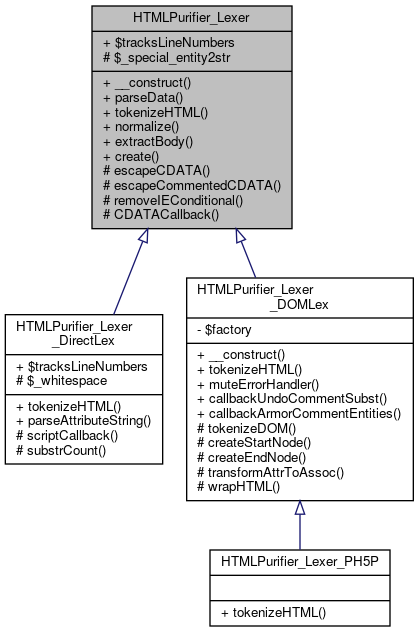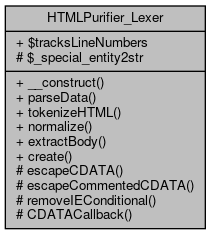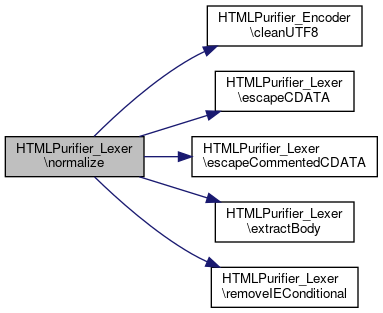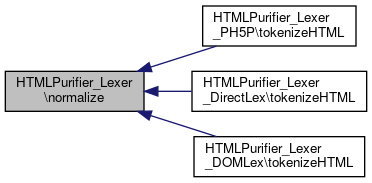Forgivingly lexes HTML (SGML-style) markup into tokens. More...
 Inheritance diagram for HTMLPurifier_Lexer:
Inheritance diagram for HTMLPurifier_Lexer: Collaboration diagram for HTMLPurifier_Lexer:
Collaboration diagram for HTMLPurifier_Lexer:Public Member Functions | |
| __construct () | |
| parseData ($string) | |
| Parses special entities into the proper characters. More... | |
| tokenizeHTML ($string, $config, $context) | |
| Lexes an HTML string into tokens. More... | |
| normalize ($html, $config, $context) | |
| Takes a piece of HTML and normalizes it by converting entities, fixing encoding, extracting bits, and other good stuff. More... | |
| extractBody ($html) | |
| Takes a string of HTML (fragment or document) and returns the content. More... | |
Static Public Member Functions | |
| static | create ($config) |
| Retrieves or sets the default Lexer as a Prototype Factory. More... | |
Data Fields | |
| $tracksLineNumbers = false | |
| Whether or not this lexer implements line-number/column-number tracking. More... | |
Static Protected Member Functions | |
| static | escapeCDATA ($string) |
| Translates CDATA sections into regular sections (through escaping). More... | |
| static | escapeCommentedCDATA ($string) |
| Special CDATA case that is especially convoluted for <script> More... | |
| static | removeIEConditional ($string) |
| Special Internet Explorer conditional comments should be removed. More... | |
| static | CDATACallback ($matches) |
| Callback function for escapeCDATA() that does the work. More... | |
Protected Attributes | |
| $_special_entity2str | |
| Most common entity to raw value conversion table for special entities. More... | |
Detailed Description
Forgivingly lexes HTML (SGML-style) markup into tokens.
A lexer parses a string of SGML-style markup and converts them into corresponding tokens. It doesn't check for well-formedness, although its internal mechanism may make this automatic (such as the case of HTMLPurifier_Lexer_DOMLex). There are several implementations to choose from.
A lexer is HTML-oriented: it might work with XML, but it's not recommended, as we adhere to a subset of the specification for optimization reasons. This might change in the future. Also, most tokenizers are not expected to handle DTDs or PIs.
This class should not be directly instantiated, but you may use create() to retrieve a default copy of the lexer. Being a supertype, this class does not actually define any implementation, but offers commonly used convenience functions for subclasses.
- Note
- The unit tests will instantiate this class for testing purposes, as many of the utility functions require a class to be instantiated. This means that, even though this class is not runnable, it will not be declared abstract.
- Note
- We use tokens rather than create a DOM representation because DOM would:
- Require more processing and memory to create,
- Is not streamable, and
- Has the entire document structure (html and body not needed).
- However, DOM is helpful in that it makes it easy to move around nodes without a lot of lookaheads to see when a tag is closed. This is a limitation of the token system and some workarounds would be nice.
Constructor & Destructor Documentation
◆ __construct()
| HTMLPurifier_Lexer::__construct | ( | ) |
Reimplemented in HTMLPurifier_Lexer_DOMLex.
Member Function Documentation
◆ CDATACallback()
|
staticprotected |
Callback function for escapeCDATA() that does the work.
- Warning
- Though this is public in order to let the callback happen, calling it directly is not recommended.
- Parameters
-
array $matches PCRE matches array, with index 0 the entire match and 1 the inside of the CDATA section.
- Returns
- string Escaped internals of the CDATA section.
Definition at line 279 of file Lexer.php.
◆ create()
|
static |
Retrieves or sets the default Lexer as a Prototype Factory.
By default HTMLPurifier_Lexer_DOMLex will be returned. There are a few exceptions involving special features that only DirectLex implements.
- Note
- The behavior of this class has changed, rather than accepting a prototype object, it now accepts a configuration object. To specify your own prototype, set Core.LexerImpl to it. This change in behavior de-singletonizes the lexer object.
- Parameters
-
HTMLPurifier_Config $config
- Returns
- HTMLPurifier_Lexer
- Exceptions
-
HTMLPurifier_Exception
Definition at line 69 of file Lexer.php.
Referenced by HTMLPurifier\purify().
 Here is the caller graph for this function:
Here is the caller graph for this function:◆ escapeCDATA()
|
staticprotected |
Translates CDATA sections into regular sections (through escaping).
- Parameters
-
string $string HTML string to process.
- Returns
- string HTML with CDATA sections escaped.
Definition at line 233 of file Lexer.php.
Referenced by normalize().
 Here is the caller graph for this function:
Here is the caller graph for this function:◆ escapeCommentedCDATA()
|
staticprotected |
Special CDATA case that is especially convoluted for <script>
- Parameters
-
string $string HTML string to process.
- Returns
- string HTML with CDATA sections escaped.
Definition at line 247 of file Lexer.php.
Referenced by normalize().
 Here is the caller graph for this function:
Here is the caller graph for this function:◆ extractBody()
| HTMLPurifier_Lexer::extractBody | ( | $html | ) |
Takes a string of HTML (fragment or document) and returns the content.
- Todo:
- Consider making protected
Definition at line 345 of file Lexer.php.
References $html, and $result.
Referenced by normalize().
 Here is the caller graph for this function:
Here is the caller graph for this function:◆ normalize()
| HTMLPurifier_Lexer::normalize | ( | $html, | |
| $config, | |||
| $context | |||
| ) |
Takes a piece of HTML and normalizes it by converting entities, fixing encoding, extracting bits, and other good stuff.
- Parameters
-
string $html HTML. HTMLPurifier_Config $config HTMLPurifier_Context $context
- Returns
- string
- Todo:
- Consider making protected
Definition at line 294 of file Lexer.php.
References $html, HTMLPurifier_Encoder\cleanUTF8(), escapeCDATA(), escapeCommentedCDATA(), extractBody(), and removeIEConditional().
Referenced by HTMLPurifier_Lexer_DirectLex\tokenizeHTML(), HTMLPurifier_Lexer_DOMLex\tokenizeHTML(), and HTMLPurifier_Lexer_PH5P\tokenizeHTML().
 Here is the call graph for this function:
Here is the call graph for this function: Here is the caller graph for this function:
Here is the caller graph for this function:◆ parseData()
| HTMLPurifier_Lexer::parseData | ( | $string | ) |
Parses special entities into the proper characters.
This string will translate escaped versions of the special characters into the correct ones.
- Warning
- You should be able to treat the output of this function as completely parsed, but that's only because all other entities should have been handled previously in substituteNonSpecialEntities()
- Parameters
-
string $string String character data to be parsed.
- Returns
- string Parsed character data.
Definition at line 186 of file Lexer.php.
Referenced by HTMLPurifier_Lexer_DOMLex\createStartNode(), HTMLPurifier_Lexer_DirectLex\parseAttributeString(), and HTMLPurifier_Lexer_DirectLex\tokenizeHTML().
 Here is the caller graph for this function:
Here is the caller graph for this function:◆ removeIEConditional()
|
staticprotected |
Special Internet Explorer conditional comments should be removed.
- Parameters
-
string $string HTML string to process.
- Returns
- string HTML with conditional comments removed.
Definition at line 261 of file Lexer.php.
Referenced by normalize().
 Here is the caller graph for this function:
Here is the caller graph for this function:◆ tokenizeHTML()
| HTMLPurifier_Lexer::tokenizeHTML | ( | $string, | |
| $config, | |||
| $context | |||
| ) |
Lexes an HTML string into tokens.
- Parameters
-
$string String HTML. HTMLPurifier_Config $config HTMLPurifier_Context $context
- Returns
- HTMLPurifier_Token[] array representation of HTML.
Reimplemented in HTMLPurifier_Lexer_DirectLex, HTMLPurifier_Lexer_DOMLex, and HTMLPurifier_Lexer_PH5P.
Definition at line 223 of file Lexer.php.
Field Documentation
◆ $_special_entity2str
|
protected |
◆ $tracksLineNumbers
| HTMLPurifier_Lexer::$tracksLineNumbers = false |
The documentation for this class was generated from the following file:
- Services/Html/HtmlPurifier/library/HTMLPurifier/Lexer.php










